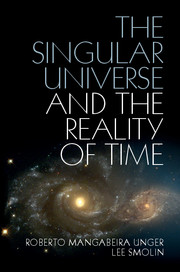Book contents
- Frontmatter
- Contents
- The nature and scope of this work
- Part I Roberto Mangabeira Unger
- Part II Lee Smolin
- 1 Cosmology in crisis
- 2 Principles for a cosmological theory
- 3 The setting: the puzzles of contemporary cosmology
- 4 Hypotheses for a new cosmology
- 5 Mathematics
- 6 Approaches to solving the meta-law dilemma
- 7 Implications of temporal naturalism for the philosophy of mind
- 8 An agenda for science
- 9 Concluding remarks
- Acknowledgments
- References
- A note concerning disagreements between our views
- Index
5 - Mathematics
Published online by Cambridge University Press: 05 December 2014
- Frontmatter
- Contents
- The nature and scope of this work
- Part I Roberto Mangabeira Unger
- Part II Lee Smolin
- 1 Cosmology in crisis
- 2 Principles for a cosmological theory
- 3 The setting: the puzzles of contemporary cosmology
- 4 Hypotheses for a new cosmology
- 5 Mathematics
- 6 Approaches to solving the meta-law dilemma
- 7 Implications of temporal naturalism for the philosophy of mind
- 8 An agenda for science
- 9 Concluding remarks
- Acknowledgments
- References
- A note concerning disagreements between our views
- Index
Summary
If the view proposed in previous chapters is to have a chance of succeeding it must resolve several puzzles connected with the nature of mathematics and its role in physics. The problem is that our two principles – that there is one real world and that time is real and goes all the way down – make trouble for our received accounts of mathematics and of its role in the scientific study of nature. According to the view most commonly held among physicists and mathematicians, mathematics is the study of a timeless but real realm of mathematical objects. This contradicts our principles twice over, both because there is no real realm other than our one universe and because there is nothing real or true that is timeless.
A new conception: mathematics as evoked reality
The choice between whether mathematics is discovered or invented is a false choice. Discovered implies something already exists and it also implies we have no choice about what we find. Invented means that it did not exist before AND we have choice about what we invent.
- Type
- Chapter
- Information
- The Singular Universe and the Reality of TimeA Proposal in Natural Philosophy, pp. 422 - 446Publisher: Cambridge University PressPrint publication year: 2014

